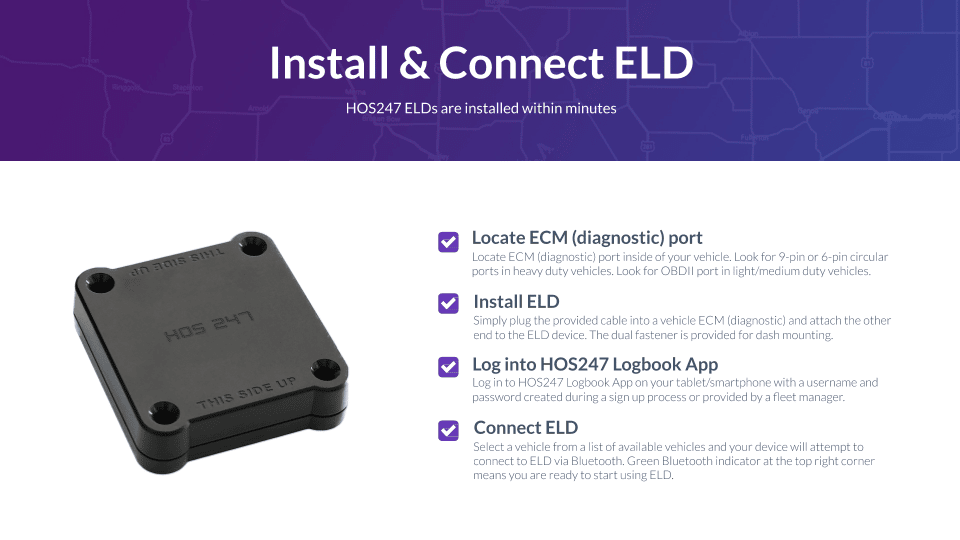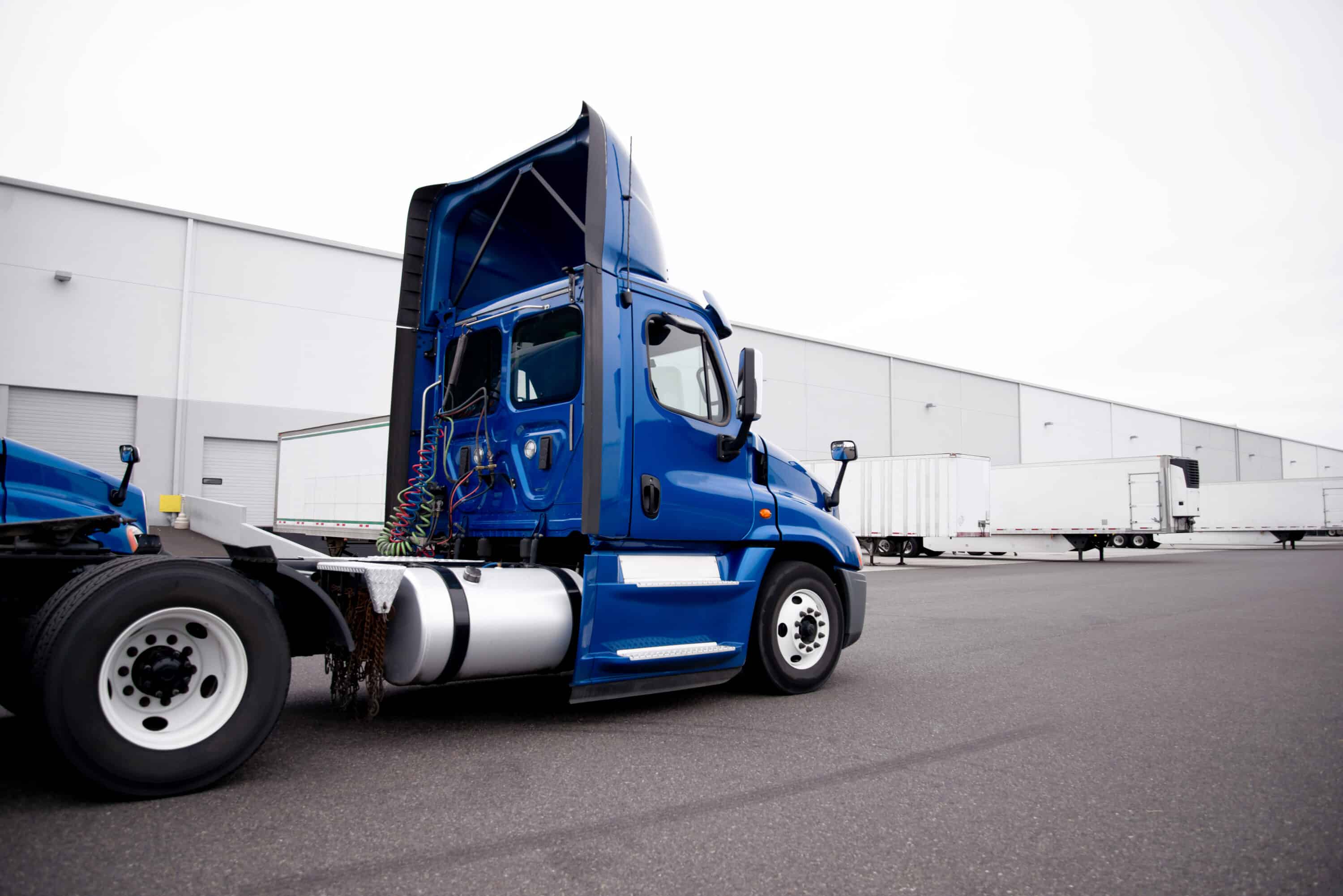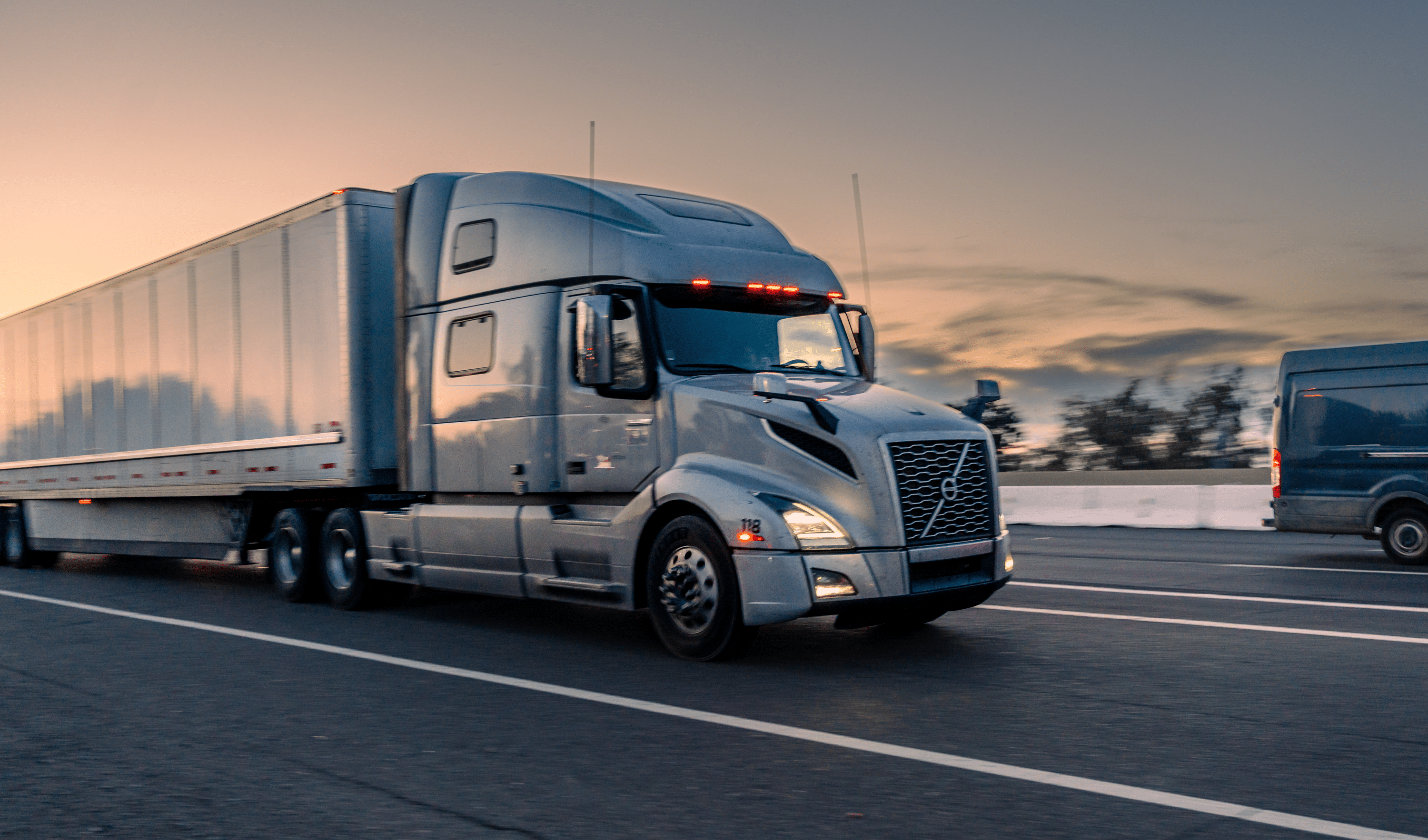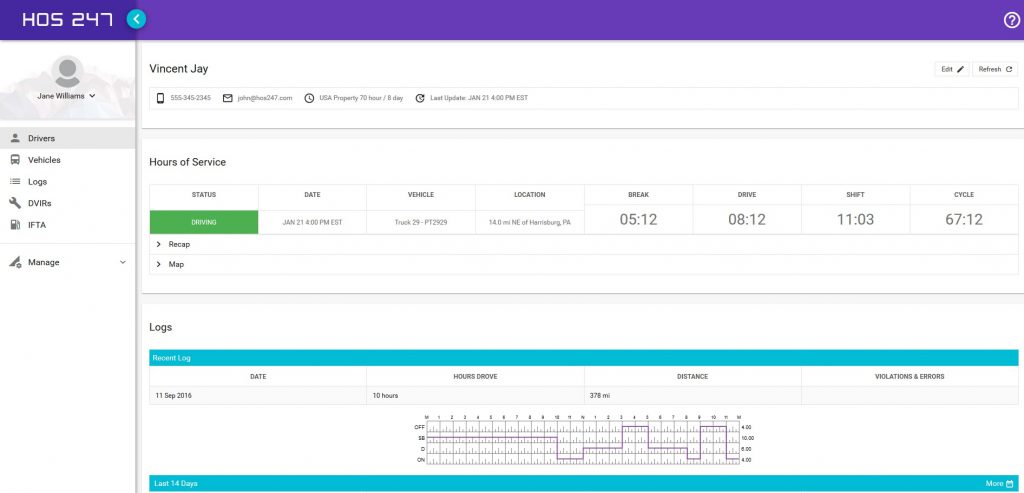The transportation industry has changed dramatically with the ELD (electronic logging device) mandate. For truckers and fleet owners, electronic logging devices are no longer just about compliance – they’re tools that can help run a smarter, more profitable operation. But with dozens of ELD providers in the market, making the right choice is crucial for your business success.
Great trucking businesses manage their compliance and operations properly. Make the ELD mandate work for you and enhance your bottom line. We’ve drafted this ELD trucking guide to help you choose your electronic logbook wisely.
Time spent on the wrong electronic logbook means lost money and frustrated drivers. Whether you’re looking to switch providers or implement your first electronic logbook, understanding what makes a reliable ELD system is essential. Let’s break down what you need to know to make electronic logs work for your business.
Do you have any questions? Talk to ELD Advisor: 650-405-3372 or Request Callback
The ELD Mandate
The FMCSA rule, or ELD mandate, requires qualified commercial motor vehicle (CMV) drivers to have on board and use an ELD, commonly known as an electronic logbook. These mandated devices are designed to capture hours of service (HOS), engine data (miles, engine hours, engine status) along with GPS coordinates automatically to prepare records of duty status (RODS) electronically. Owner-operators and small trucking companies are not exempt from the ELD mandate.
Who’s exempt from the ELD rule? You might qualify for an exemption if you fall into one of these categories:
- Pre-2000 vehicles. If your truck’s engine was manufactured before 2000, you can still use paper logs. This is because older engines lack the standardized electronic systems needed for ELD connectivity.
- Short-haul operators. Drivers staying within a 150-air-mile radius who return to their work base daily and maintain time cards may qualify for the short-haul exemption.
- Drive-away-tow-away operations. If you’re delivering a vehicle that’s part of your shipment (like transporting a truck for sale), you’re exempt from ELD requirements.
- Occasional drivers. If you use paper logs for no more than 8 days in any 30-day period, you don’t need an ELD.
For everyone else, here’s what FMCSA requires from your ELD:
- Engine synchronization. Your ELD must connect directly to your truck’s engine to automatically record drive time and miles. No manual entries means no room for errors in your logs.
- Location tracking. The device needs to record your location at specific intervals, but don’t worry – it only logs coordinates within a 1-mile radius during on-duty driving and 10-mile radius during off-duty time.
- Data security. Your logs must be tamper-resistant and include driver verification. Simple edit functions let you fix mistakes while keeping the original records intact.
- Display requirements. During roadside inspections, you need to show your logs either on a display screen or as a printout. Most modern ELDs let you handle this right from a tablet or smartphone.
While the mandate might seem complicated, the right electronic logbooks actually makes logging easier than paper logs ever were. Instead of spending time calculating hours and drawing grid lines, you can focus on what matters – driving safely and getting paid for your miles.

How to Choose an ELD Device
With so many truckers needing ELDs, the market is flooded with a wide range of electronic logbook options for HOS monitoring. Before you sign on the dotted line, make sure the device you choose is the best fit for your trucking needs. At a minimum, the ELD vendor should explain how their product meets FMCSA standards.
User Reviews
Do your homework before buying the shiny package to make sure it contains what you need. ELD devices can be expensive, especially when multiplied by the number of vehicles in your fleet, and it is important to protect your investment. Compare reviews from truckers like yourself who use elogs every mile of the road on independent platforms like the App Store and Google Play.
Ease of Use
If that ELD requires ten certified engineers with fancy degrees to work, beware. If any driver must read a manual the size of a law book, watch out. ELDs are automatic and should be almost as easy as using a cell phone. Try out the HOS247 solution with no contracts and hassle-free, two-week return policy.
Customer Support
If you or your drivers have questions about the ELD, support should be available when you need it. Human beings talk to other human beings to provide support, rather than recordings or robots. Your business and time are too valuable for anything less which is why HOS247 takes customer service and support seriously and even offers assistance in multiple languages.
Hardware Reliability
Your ELD is going to face the same conditions you do on the road – extreme temperatures, constant vibration, and rough weather. A reliable ELD should work consistently in all weather conditions and handle the daily wear and tear of trucking. Cheap hardware often leads to connectivity issues, which can result in HOS violations and unnecessary downtime.
Data Backup Systems
Road conditions aren’t always perfect, and neither is cellular coverage. Your electronic logs needs to keep working even when you’re out of cell range. Look for systems that automatically save your logs locally and sync them when connection is restored. This ensures you’re always compliant and can confidently present your logs during roadside inspections.
Simple Installation
Quality ELDs should take no more than 30 minutes to install and get running. If a provider tells you their system needs special tools or complex setup procedures, that’s a red flag. The best ELDs plug into your diagnostic port, connect to your tablet or smartphone, and you’re ready to roll.
Warning Signs
Be cautious of providers requiring expensive proprietary hardware. Most quality ELDs work well with standard smartphones or tablets, keeping your costs manageable. Also, be wary of long-term contracts. Quality providers typically offer flexible terms, showing confidence in their product’s value.
ELD for Interstate and Intrastate Trucking
Understanding whether your operation is interstate or intrastate is crucial for proper ELD compliance. Here’s what you need to know about both.
Interstate Operations
Interstate commerce involves crossing state lines or hauling cargo that will eventually cross state lines. If you operate interstate, federal regulations apply:
- You must register with the DOT and obtain a USDOT number.
- You must comply with federal ELD regulations.
- Your ELD must be on FMCSA’s registered devices list.
Intrastate Operations
Intrastate commerce means you operate solely within one state’s borders. While most states have adopted federal elog requirements, some have their own specific rules:
- Many states mirror federal regulations but may have different exemptions
- Some states have modified hours-of-service rules
- Local commercial zones might have special provisions
Mixed Operations
If you run both interstate and intrastate routes, you’ll need to:
- Follow the stricter of the two rules when they conflict.
- Maintain proper documentation for both types of operations.
- Ensure your ELD can handle different rule sets.
Even if you’re primarily an intrastate carrier, accepting just one load that crosses state lines makes you subject to federal regulations. Choose an ELD that can handle both interstate and intrastate rules to keep your options open.
Fleet Management Features
A quality ELD system should do more than just track hours of service. Today’s solutions can help you run a more efficient, profitable operation by providing tools that streamline your business and reduce operational costs. Here are the key features to consider beyond basic compliance.
GPS Fleet Tracking
Real-time location tracking gives you complete visibility of your fleet’s movements. Know exactly where each truck is, optimize routes on the fly, and provide accurate ETAs to your customers. Quality GPS tracking also creates detailed trip histories, helping you verify deliveries, analyze routes, and handle customer disputes with confidence.
Engine Diagnostics
Modern ELD systems can read and interpret engine fault codes in real time. Instead of waiting for a breakdown, you’ll know immediately when your truck needs attention. This early warning system helps you schedule maintenance at convenient times and locations, avoiding costly roadside repairs and missed deliveries.
Maintenance Scheduling
Stay ahead of vehicle maintenance with automated scheduling based on real-time engine data. Quality systems track service intervals, alert you when maintenance is due, and keep detailed service records. Some providers even help you locate nearby service centers and track repair costs over time.
IFTA Mileage Reporting
The International Fuel Tax Agreement (IFTA) simplifies fuel taxes for carriers that operate between the lower 48 states and Canadian provinces. Carriers file fuel tax reports quarterly. Those fuel tax reports are mandatory for vehicles weighing over 26000 pounds with either 2 or 3 axles or a combination of axles. Automated reporting simplifies calculations. Mileage can be automatically collected and downloaded, which is a great time-saver.
Fuel Optimization
Track and reduce fuel costs across your fleet. Quality systems monitor idle time, analyze driving patterns that impact fuel consumption, and help optimize routes for better fuel economy. Some systems even integrate with fuel card programs, automatically matching fuel purchases with miles driven for better accountability.
Idle Monitoring
Keep track of excessive idling that wastes fuel and increases engine wear. Quality systems provide detailed reports on idle time per vehicle, helping you identify patterns and reduce unnecessary idling. Some even send real-time alerts when trucks idle beyond preset thresholds, allowing for immediate corrective action.
The right combination of tools can help you save on fuel, reduce maintenance costs, and run a more efficient operation. When choosing an ELD provider, consider which of these features would benefit your specific operation the most.

HOS247: A Reliable ELD Trucking Partner
HOS247 delivers an electronic logging solution designed to simplify compliance and improve daily operations. With FMCSA-approved devices, a user-friendly interface, and dedicated support, truckers can count on HOS247 to keep their business running smoothly. This is why truckers appreciate our services:
- Quality customer support. Our multilingual team provides direct assistance in English, Spanish, Russian, and Polish. No phone trees or automated menus—just knowledgeable professionals ready to help.
- Stable bluetooth connectivity. Ensures a seamless connection between the ELD and mobile device, reducing sync errors and data loss.
- Easy-to-use app. Designed with truckers in mind, the HOS247 app features a straightforward interface that makes logging hours, managing DVIRs, and showing logs during inspections simple and hassle-free. Available for both Android and iOS, it minimizes the learning curve so drivers can focus on the road.
- Hardware warranty. Our ELD hardware is built for durability, and we stand behind its quality. Every device comes with a one-year warranty, ensuring quick replacements if any issues arise, so truckers can stay compliant without unnecessary downtime.
- Flexible terms. HOS247 offers no-contract service, a hassle-free two-week return policy, and transparent pricing with no hidden fees. Truckers stay because they want to, not because they’re locked in.
- Easy implementation. Setup is simple, with most drivers installing the device in under 30 minutes. The intuitive interface ensures quick onboarding, and free training is available to help fleets get started.
- Committed to your success. HOS247 continuously improves its system based on our users’ feedback. We stay engaged after the sale to ensure our technology evolves with your needs.
HOS247 combines dependable hardware, practical features, and driver-focused support to create an ELD system that works as hard as you do. With a commitment to reliability and ease of use, we help truckers stay compliant, productive, and stress-free on the road.

Cost and ROI: Making ELDs Work for Your Budget
Understanding ELD costs goes beyond just looking at the monthly fee. Smart trucking businesses consider both the total investment and potential returns before making their choice.
Your initial investment includes the device itself, installation time, and driver training. While some providers advertise low hardware costs, remember that quality equipment pays off through reliability and fewer headaches down the road.
Monthly operating costs typically include:
- Subscription fees for the elog service.
- Data plan costs if not using your existing devices.
- Software updates and maintenance.
- Technical support services.
Watch for hidden charges in the fine print. Common surprises include fees for additional users, basic features like IFTA reporting, or regulatory updates that should be included. Quality providers are upfront about their total costs and don’t hide extras in the contract.
The good news is that a reliable ELD system pays for itself. Drivers spend less time on paperwork, form and manner violations decrease, and automated tracking improves billing accuracy. Many operators also see lower insurance premiums due to better safety records and documented compliance.
Do you have any questions? Talk to ELD Advisor: 650-405-3372 or Request Callback
Common Pitfalls and How to Avoid Them
Even experienced truckers can run into problems with ELDs. Understanding common issues helps you avoid them from the start.
Poor Connectivity
Connection issues between your ELD and the engine or tablet can cause compliance problems. Test cellular coverage on your regular routes before choosing a provider. Understand how your electronic logbook handles offline operation and keep paper logs as backup during malfunctions – it’s required by FMCSA anyway.
Unresponsive Support
When problems arise, waiting hours for technical support isn’t an option. Test response times before committing to a provider and have a clear process for handling malfunctions. Know your provider’s replacement policy and keep backup devices ready if needed.
Device Malfunctions
Hardware failures can leave you scrambling to maintain compliance. Choose providers with proven reliability records and clear procedures for device replacement. Understanding how to document malfunctions properly helps you avoid violations during equipment problems.
Proper training prevents most violations and headaches. Make sure your drivers:
- Get hands-on practice before hitting the road.
- Know how to transfer logs during inspections.
- Understand basic troubleshooting steps.
- Have quick reference guides in their trucks.
When problems arise, you need support fast. Test response times before committing to a provider and have a clear process for handling malfunctions. Keep backup tablets or smartphones ready if needed, and understand your provider’s replacement policy.

Conclusion
Choosing and implementing the right ELD solution is critical for your trucking operation’s success. While compliance is mandatory, the right system does more than just meet regulations – it helps your business run more efficiently and profitably.
The size and type of your operation, your regular routes, and your service areas should all factor into your decision. Consider which features will benefit your business most and what level of support you’ll need for your team. Remember that the cheapest option rarely provides the best value in the long run.
Success with electronic logbooks comes down to finding a provider that offers reliable hardware for daily use, regular software updates for compliance, and responsive customer support when you need it. Look for fair pricing without hidden fees and a solid track record of satisfied customers. A provider’s reputation in the industry often tells you more than their sales pitch.
By following this guide and choosing a reputable provider like HOS247, you can turn the ELD mandate from a regulatory requirement into a business advantage. Take your time, do your research, and select a solution that will serve your business well for years to come.

I’ve co-founded, built and managed several transportation-related businesses. Now, I’m a founder and CEO of HOS247 – an AI Transportation Platform for trucking companies, freight brokers and other logistics operations. We are transitioning old-style operations to technology-advanced logistics entities and help them to grow their businesses. ELDs (electronic logging devices), fleet tracking and management 2.0 combined with AI-powered dispatch tools.












Choosing the Best Vehicle Driver Log Book Solution As a trucker, navigating the complex world of electronic logging devices (ELDs) and the Federal Motor Carrier Safety Administration’s (FMCSA) ELD mandate can be a daunting task. From learning the technical aspects

The way we manage truck fleets has changed a lot over the years, especially with the introduction of real time fleet management. This modern way of keeping track of trucks, cargos, and drivers as they move has made a big

HOS247 Is an Industry Leader Providing FMCSA-Approved ELD Devices Having an FMCSA-approved ELD device is more important now than ever for fleet managers and their drivers. But not just any ELD will do, even if it is an FMCSA-certified ELD.
